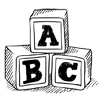Introduction: Early childhood education is a critical phase of a child’s development, and wooden blocks have a prominent place in enriching this journey. These timeless toys offer endless learning possibilities that support holistic development across cognitive, physical, social, and emotional domains. In this blog, we’ll explore the role of wooden blocks in early childhood education and their contribution to fostering well-rounded growth in young learners.
- Cognitive Development: Wooden block play stimulates cognitive growth by encouraging problem-solving, spatial reasoning, and understanding of mathematical concepts such as symmetry and balance.
- Fine and Gross Motor Skills: Handling and manipulating wooden blocks develop fine motor skills, while building structures enhances gross motor skills, fostering physical development.
- Social Skills: When children collaborate and build together, they learn essential social skills like communication, negotiation, and cooperation, nurturing their social development.
- Creativity and Imagination: Wooden blocks provide an open-ended play experience that sparks creativity and imagination, allowing children to explore and express their ideas freely.
- Emotional Regulation: Building with wooden blocks can be a calming and soothing activity, supporting emotional regulation and mindfulness in young children.
Conclusion: Wooden blocks play a pivotal role in early childhood education by promoting cognitive development, fine and gross motor skills, social skills, creativity, and emotional regulation. As educators and parents incorporate wooden blocks into learning environments, they provide children with a versatile and enriching tool for holistic development. By embracing the benefits of wooden block play, we empower young learners to thrive academically, socially, and emotionally, setting them on a path of lifelong learning and success.








